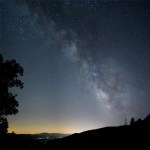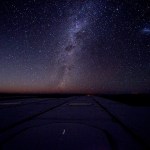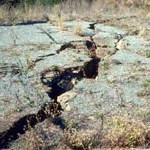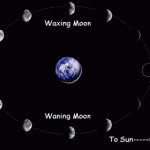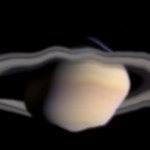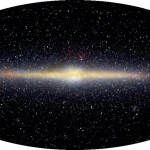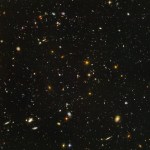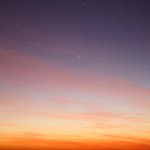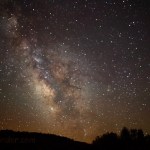Astronomy
"Keep up the good work, if only for a while, if only for the twinkling of a tiny galaxy." -Wislawa Szymborska
Our Milky Way Galaxy is home to not only our Earth and our Solar System, but hundreds of billions of other stars.
Image credit: Aarne Bielefeldt.
Held together by not only the incredible gravity of all of our stars, but by dark gas and dust far outweighing all the stars, and by trillions of suns worth of dark matter as well, our galaxy represents one of perhaps a hundred billion just like it in our vast Universe.
Image credit: NASA, ESA, R. Windhorst, S. Cohen, M. Mechtley, M.…
Science is awesome.
Click the image to biggify.
The European Southern Observatory says:
The first European antenna for the Atacama Large Millimeter/submillimeter Array (ALMA) has reached new heights, having been transported to the observatory's Array Operations Site (AOS) on 27 July 2011. The 12-metre diameter antenna has arrived at the Chajnantor plateau, 5000 metres above sea level. Here, it joins antennas from the other international ALMA partners, bringing the total number at the AOS to 16.The plateau's elevated location -- 2100 metres higher than the OSF -- gives it the extremely dry…
"To correct a natural indifference I was placed half-way between misery and the sun. Misery kept me from believing that all was well under the sun, and the sun taught me that history wasn't everything." -Albert Camus
Our Sun has been shining brightly for over four billion years now, giving light, heat, and energy to our entire Solar System. But -- like every other star -- it won't continue to burn forever. In an estimated five-to-seven billion years, the Sun will cease its nuclear fusion reactions, and eventually contract down into a white dwarf star, losing a good fraction of its mass and…
"A fact is a simple statement that everyone believes. It is innocent, unless found guilty. A hypothesis is a novel suggestion that no one wants to believe. It is guilty, until found effective." -Edward Teller
The idea of black holes has gone from a curious thought experiment to a theoretical likelihood to a near-certainty -- with thousands of known candidates -- in a very short time.
Image credit: NASA/Dana Berry, SkyWorks Digital.
But never before have we been able to image a black hole directly; all we have are artists' renditions of what they might look like.
And for the first time ever…
The Universe is a little less than 14 billion years old. Humanity, maybe 200,000. We have reached for knowledge at every step, and recorded what we could. The pace of our knowledge seems to accelerate; the 20th century tranformed our understanding of reality, as had the previous millenium. In 2011, we gather more information than ever before, and our knowledge seems almost complete. But it's funny how things change. On Built on Facts, Matt Springer says James Clerk Maxwell's electromagnetic equations are as good today as they were in the 1860's, despite a little thing called relativity. Matt…
"Where there is an observatory and a telescope, we expect that any eyes will see new worlds at once." -Henry David Thoreau
The night sky is our greatest glimpse of what lies out there, beyond our own world, in the expanse of space we know as our Universe.
Image credit: European Southern Observatory.
With our naked eyes, we are able to see a few thousand stars, the Moon, five planets, the Milky Way and a few other nebulous "clouds" or "fuzzballs." And with just our naked eyes alone, we could learn some remarkable things about the Universe, including the basic structure of our Solar System…
"Through space the universe encompasses and swallows me up like an atom; through thought I comprehend the world." -Blaise Pascal
Whether you have or haven't seen the xkcd webcomic, height (or my old post referencing it), one of the things that I can't imagine not fascinating you is what you see the farther "up" you look.
So what I'm going to do is start off in the vicinity of Earth and go "up" by approximately a factor of 100 every time. Let's begin.
Ahh, outer space. Looking down at the Earth from a distance, what would you see? Well, other than the planet itself, you'd see the (literally…
By Dr. Friedemann Freund; Carl Sagan Center for the Study of Life in the Universe, SETI Institute, and Gail Jacobs
Friedemann Freund doesn't shrink from taking on the really big problems. His research has elucidated such important phenomena as the fact that rocks under stress behave like batteries that can produce currents deep within the crust of the Earth. These are not piddling electron flows, either - the currents could be as large as millions of amperes, sufficient to be measured above ground, and perhaps even from orbit. Understanding and exploiting this phenomenon could lead to a…
"It is one of life's bitterest truths that bedtime so often arrives just when things are really getting interesting." -Lemony Snicket
Those of you who live basically anywhere other than North America are in for a treat this Wednesday. All over Earth, of course, the Moon is nearing its "full" phase, where the half of the Moon illuminated by the Sun is completely visible from Earth.
And it will reach complete fullness on Wednesday night.
Now, most times, when this happens, the full Moon is completely visible from everywhere on Earth. But every so often -- about twice a year on average -- the…
"All things move and nothing remains still" -- Heraclitus
The history of astronomy can be read as a story of better and better vision. Over the centuries, we have supplemented our vision with technology that allows us to see further and more clearly; while Ancient astronomers, who relied only on their naked eyes to perceive the universe, managed to make star catalogues and predict comets, Galileo, pressing his to a telescope, saw all the way to the moons of Jupiter.
Optical telescopes and the human eye are fundamentally limited; early astronomers were forced to gaze into telescopes for…
"This nebula had such a resemblance to a comet in its form and brightness that I endeavored to find others, so that astronomers would not confuse these same nebulae with comets just beginning to shine." -Charles Messier
Astronomers have been scouring the skies for new discoveries since long before the invention of the telescope. Why, just with the naked eye and some dark skies, anyone can discover about 6,000 stars, five major planets, the Milky Way, and the occasional very faint nebula.
Image credit: Miloslav Druckmuller.
And of course, if you're very fortunate and very diligent, you could…
"We are just an advanced breed of monkeys on a minor planet of a very average star. But we can understand the Universe. That makes us something very special." -Stephen Hawking
You're probably familiar with the standard picture of our Universe. You've heard it all before: that the Universe we know of -- stars, planets, atoms, etc. -- is less than 5% of the Universe's total energy. That most of the matter is dark matter, and that most of the energy in the Universe isn't matter at all, but dark energy.
But recently, we've started to discover a couple of interesting things about the atoms in the…
"If the Universe Is Teeming with Aliens... Where Is Everybody?" -Stephen Webb
As egocentric as we are, we know that not only are we but one planet of many orbiting our Sun, but that when we look up in the heavens, every point of light we see is another chance -- another opportunity -- for planets, for life, and even for intelligence.
Image credit: Ned Wright, COBE / DIRBE, and NASA.
With hundreds of billions of stars (visible here in infrared wavelengths) in our galaxy alone, we have many, many chances for life to have evolved similarly to how it did here on Earth. With hundreds of billions…
Greg Laden draws our attention to an object named Vesta, which by itself makes up 9% of the asteroid belt. Greg says "if you take the largest handful of objects in the asteroid belt, Ceres, Vesta, Pallas and 10 Hygiea, you've got half of the mass of the entire thing, according to the most current estimates." According to NASA, Vesta is even differentiated, meaning it was once hot enough to form a core, mantle, and crust. On Life at the SETI Institute, the Analysis Lead on NASA's Kepler project explains how to spot a planet from hundreds of millions of miles away. Dr. Jon Jenkins says "We…
"Master looks after us now, we don't need you anymore. Leave now and never come back!" -Smeagol, LOTR
You all know how to find the farthest galaxy ever, right? You take the most powerful telescope in the world, put it into space, and have it stare into the darkness for days on end. What do you find?
Image credit: Hubble Ultra Deep Field.
Galaxies! In just a tiny area like this, only about a fiftieth of a single degree on a side, over ten thousand galaxies are visible.
And, as you'll notice if you click through, and zoom in on a small section of these, some of these galaxies are much dimmer…
"If you're going to do something tonight that you'll be sorry for tomorrow morning, sleep late." -Henny Youngman
Normally, the best wonders of the night sky -- stars, planets and beyond -- happen, well, late at night. But every once in a while, it's actually the very early morning sky that holds the greatest sights. Just make sure you get up before -- as David Grisman and Tony Rice might tell you -- your sky is ruined by the
Morning Sun.Why's that? Well, if you look to the East, just before sunrise, you might see a sight like this:
Image credit: Luis Argerich.
Well, what do we have here?…
"God does not play dice with the Universe." -Einstein
"Einstein, don't tell God what to do." -Neils Bohr (disputed, but awesome)
Einstein, the brilliant mind behind general relativity and the concept of "spacetime," is making the news again this week. As you all know, gravity isn't some mysterious invisible force traveling across space, it comes about because energy itself -- most commonly in the form of mass -- distorts the very fabric of space.
Image credit: GNU user Johnstone and NASA's Galileo spacecraft.
Of course, wrapping your head around this can prove quite difficult. Space, as we…
"I have departed from this planet and I have left behind my poor earthly ones with their occupations which are as many as they are useless; at last I am living in the scintillating splendor of the stars, each of which used to seem to me as large as millions of suns." -Jules Massenet
Each star in the night sky, just a distant, shining point of light, holds the same potential as our Sun. The potential for other worlds, for life, for civilization both as we know it and as we can only imagine it. On a clear, dark night, the possibilities seem almost limitless.
Image credit: ForestWander, Summit…
On Uncertain Principles, Chad Orzel differs with Neil Degrasse Tyson, saying that scientific thinking isn't that new, or that exclusive, and in fact has defined humanity from the very beginning. Chad describes science as "a method for figuring things out: you look at some situation, come up with a possible explanation, and try it to see if it works." We start with idle hands, move on to stone tools, furrowed fields, Egyptian pyramids, Roman aqueducts, and now the pinnacle of our drive to master the universe, the iPad 2. In a follow-up article, Chad dismisses stereotypes of the scientific…
"Listen; there's a hell of a good universe next door: let's go." -e. e. cummings
Sometimes, you just need to take stock of what we know, and appreciate how far we've come. A hundred years ago, we thought the Universe consisted of the stars and nebulae in our Milky Way. We thought Newton's Law of Gravity governed it all, and that the other forces -- electromagnetism and a few weird quantum things -- were all there was.
So why not -- all in one article -- go through the entire history of the Universe, from as early as we can say anything sensible to as late as we can say anything sensible? Let'…
